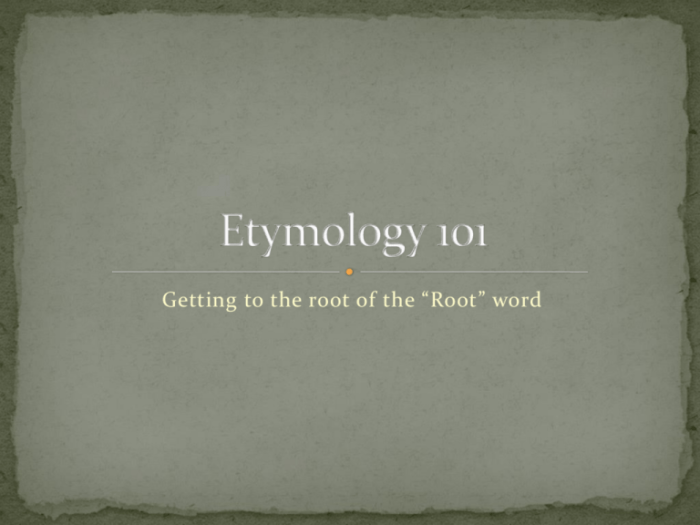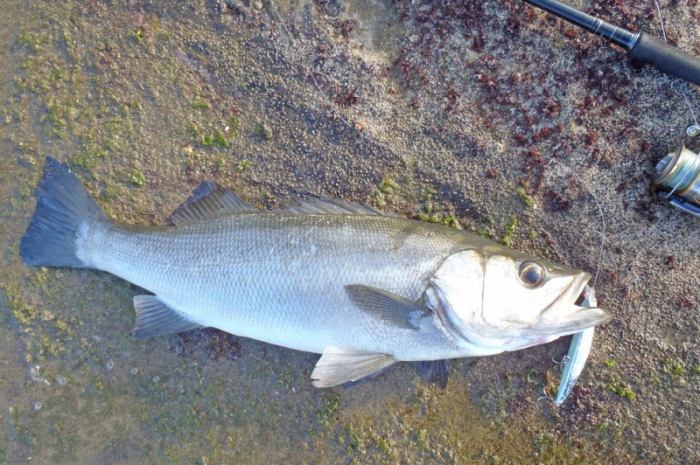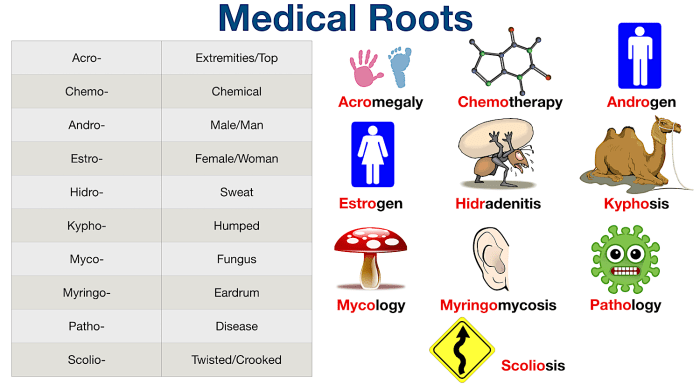Translate the root ichthy o – Translate the root “ichthy” into English and embark on a fascinating exploration into the world of fish and aquatic life. This etymological adventure will unravel the rich history, scientific significance, and cultural impact of this ancient Greek word.
From its origins in the study of fish to its modern applications in marine biology and conservation, “ichthy” holds a profound connection to our understanding of the aquatic realm.
Etymology

The root word “ichthy” originates from the Greek word “ichthys,” which means “fish.” It is commonly used in scientific terms and names related to the study of fish, known as ichthyology.
Over time, the term “ichthy” has evolved to encompass a wider range of concepts within ichthyology, including the classification, anatomy, physiology, behavior, and ecology of fish.
Origin and Meaning
The root word “ichthy” is derived from the Proto-Indo-European root “*pisk-” or “*peisk-,” which also means “fish.” This root is found in many Indo-European languages, including Latin (“piscis”), Sanskrit (“matsya”), and Old English (“fisc”).
Relation to the Study of Fish, Translate the root ichthy o
The root word “ichthy” is closely related to the study of fish because it provides a common linguistic basis for terms and concepts used in ichthyology. For example, the term “ichthyologist” refers to a scientist who specializes in the study of fish, while “ichthyofauna” refers to the fish population of a particular area.
Biological Significance

The root “ichthy” plays a crucial role in scientific classification, specifically in the study of fish. It serves as a key indicator of an organism’s affiliation with the class Pisces, the group comprising all fish species.
The Greek root “ichthy” refers to fish, a term you might encounter in biology or marine studies. If you’re delving into the world of psychology, you’ll find the AP Psychology Unit 7 vocab particularly relevant. This unit covers topics related to memory, learning, and cognition, providing insights into the fascinating processes of our minds.
As you explore these concepts, remember the significance of the “ichthy” root and its connection to aquatic life.
By incorporating “ichthy” into scientific names, taxonomists establish a clear and consistent system for identifying and categorizing different fish species. This helps scientists distinguish between various groups of fish, understand their evolutionary relationships, and facilitate effective communication within the scientific community.
Examples of Scientific Names
- Ichthyophis: A genus of caecilian amphibians, indicating their fish-like appearance.
- Ichthyostega: An extinct genus of early tetrapods, highlighting their fish-like characteristics.
- Ichthyornis: A genus of extinct seabirds, reflecting their bird-like features combined with fish-like adaptations.
Cultural and Historical Impact

The root “ichthy” has left an enduring mark on human culture and history. Its association with aquatic life has shaped its significance in mythology, art, and literature.
Mythology
In ancient Greek mythology, “ichthy” is associated with the god Poseidon, the ruler of the sea. Fish were considered sacred to Poseidon and were often depicted in artwork and literature as symbols of his power and authority.
Art
The motif of fish has been a popular subject in art throughout history. From the prehistoric cave paintings of Lascaux to the Renaissance masterpieces of Leonardo da Vinci, fish have been depicted in various forms and contexts.
Literature
In literature, “ichthy” has been used to symbolize a wide range of themes and ideas. From the biblical story of the fish that swallowed Jonah to the modern novel “The Old Man and the Sea,” fish have played a significant role in shaping literary narratives.
Modern Applications

In contemporary scientific fields, “ichthy” continues to play a significant role, particularly in marine biology, ecology, and conservation efforts. Its use extends to various research areas and technologies, providing valuable insights into the study and preservation of aquatic ecosystems.
Marine Biology
In marine biology, “ichthy” aids in the classification and study of fish species, their behavior, and their interactions with the marine environment. Researchers utilize ichthyological techniques to investigate fish diversity, distribution, and abundance, contributing to a better understanding of marine ecosystems and their dynamics.
Ecology
Within ecology, “ichthy” assists in assessing the health and biodiversity of aquatic environments. By studying fish populations, ecologists can monitor changes in water quality, habitat availability, and the impacts of human activities on marine ecosystems. Ichthyological data serves as an indicator of ecosystem health, guiding conservation and management strategies.
Conservation
In conservation efforts, “ichthy” plays a crucial role in identifying endangered or threatened fish species. Researchers use ichthyological knowledge to develop conservation plans, establish marine protected areas, and implement sustainable fishing practices. By understanding the biology and ecology of fish species, conservationists can effectively protect and restore aquatic ecosystems.
Comparative Analysis: Translate The Root Ichthy O

The root “ichthy” is not the only Greek root associated with aquatic life. Other notable roots include “hydr-” (water), “thalass-” (sea), “limn-” (lake), and “potamo-” (river). These roots share a common theme of water and aquatic environments, but each has its own unique nuances and applications.
Similarities and Differences in Meanings and Applications
The root “ichthy” specifically refers to fish, while “hydr-” encompasses a broader range of aquatic concepts, including water itself, aquatic plants, and water-related phenomena. “Thalass-” focuses on the sea and its associated features, such as waves, tides, and marine life.
“Limn-” pertains to lakes and their ecosystems, while “potamo-” deals with rivers and their currents.
Etymology and Evolution of These Roots
The etymological origins of these roots provide further insights into their meanings. “Ichthy” is derived from the Proto-Indo-European root “*pisk-“, which also gave rise to the Latin “piscis” (fish). “Hydr-” stems from the Proto-Indo-European root “*wed-“, meaning “water.” “Thalass-” originates from the Proto-Indo-European root “*telh₂-“, referring to the sea.
“Limn-” is derived from the Proto-Indo-European root “*lim-“, meaning “lake.” “Potamo-” comes from the Proto-Indo-European root “*pet-“, denoting a river.
Visual Representation

Visual representation can enhance our understanding of the root “ichthy.”
Table Summarizing Key Points
The following table summarizes the key points discussed in the various sections:
| Etymology | Biological Significance | Cultural Impact | Modern Applications | Comparative Analysis |
|---|---|---|---|---|
|
Derived from Greek “ikhthus,” meaning “fish” |
Found in many aquatic organisms, including fish, amphibians, and reptiles |
Associated with water, fertility, and Christianity |
Used in scientific names, such as “Ichthyostega” |
Related to other roots, such as “aqua” and “marine” |
General Inquiries
What is the origin of the root “ichthy”?
The root “ichthy” originates from the ancient Greek word “ikhthus,” meaning “fish.”
How does “ichthy” relate to the study of fish?
“Ichthy” is a common root in scientific names for fish species, reflecting their shared evolutionary history.
What are some examples of scientific names that incorporate “ichthy”?
Examples include “Ichthyostega,” an extinct fish-like amphibian, and “Ichthyophis,” a genus of caecilian amphibians.